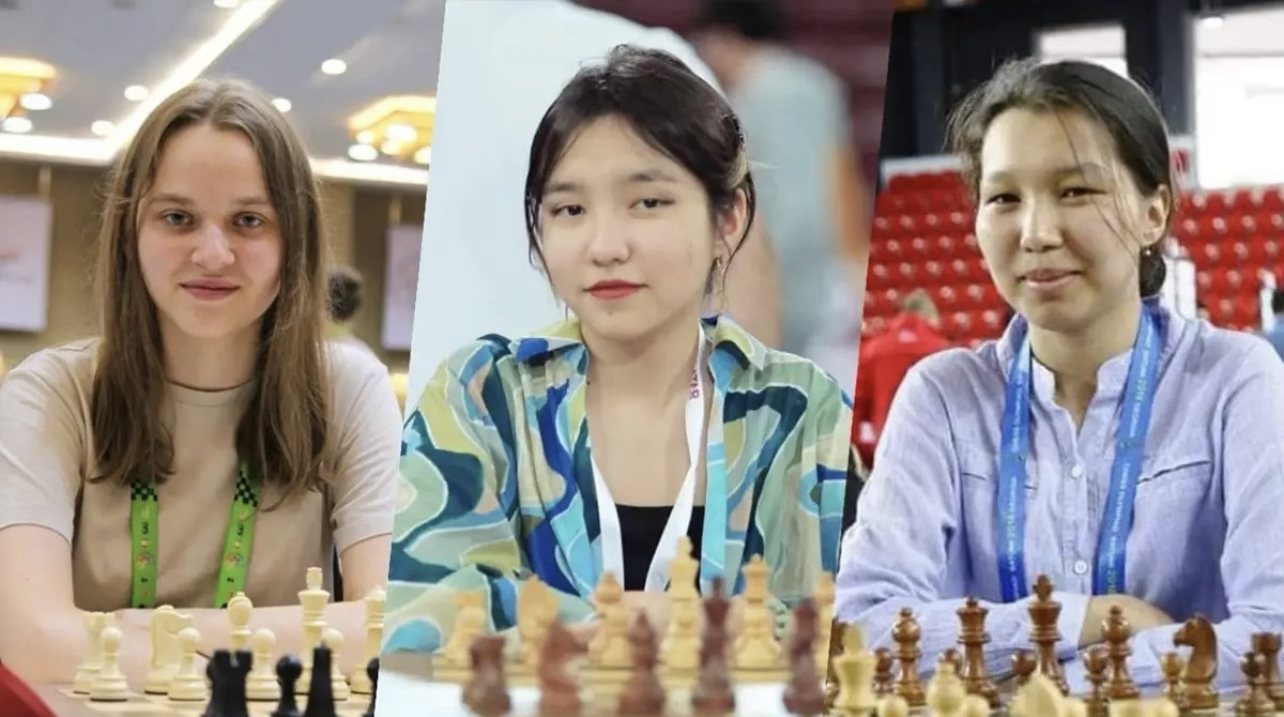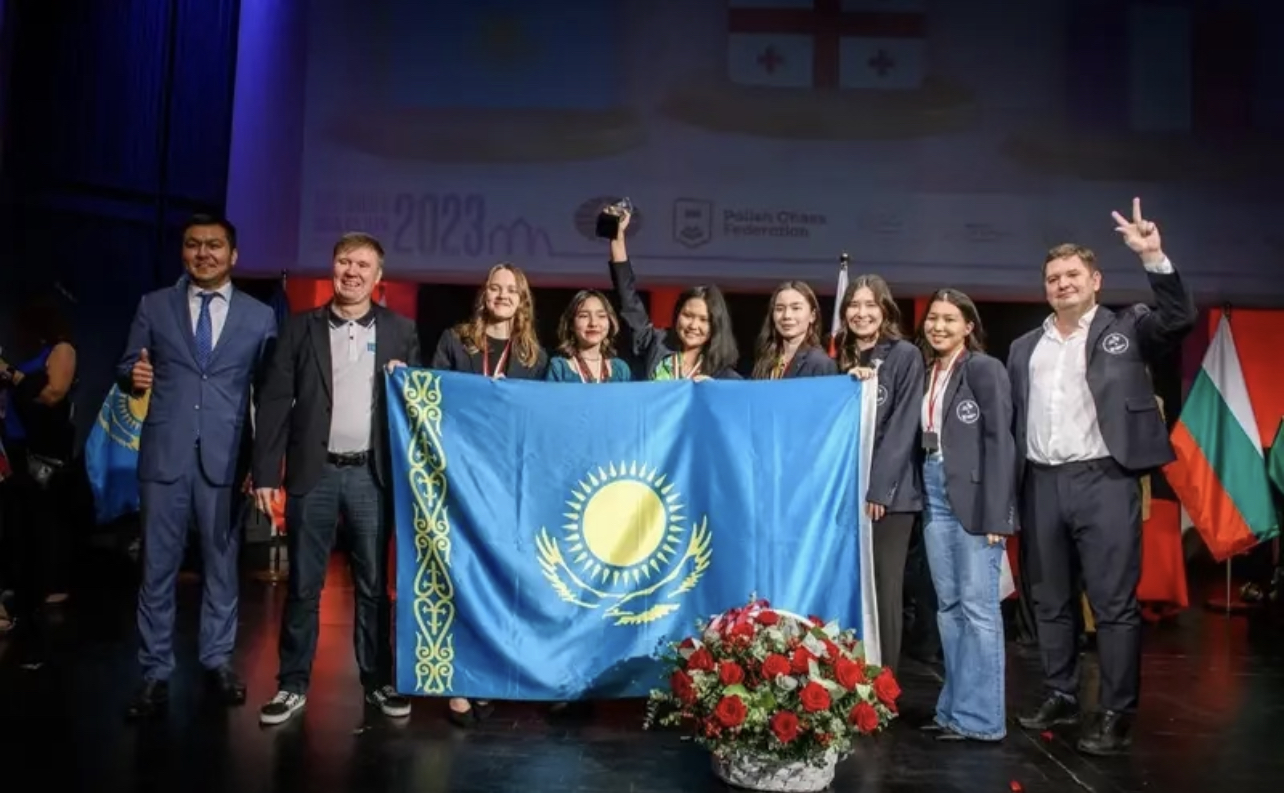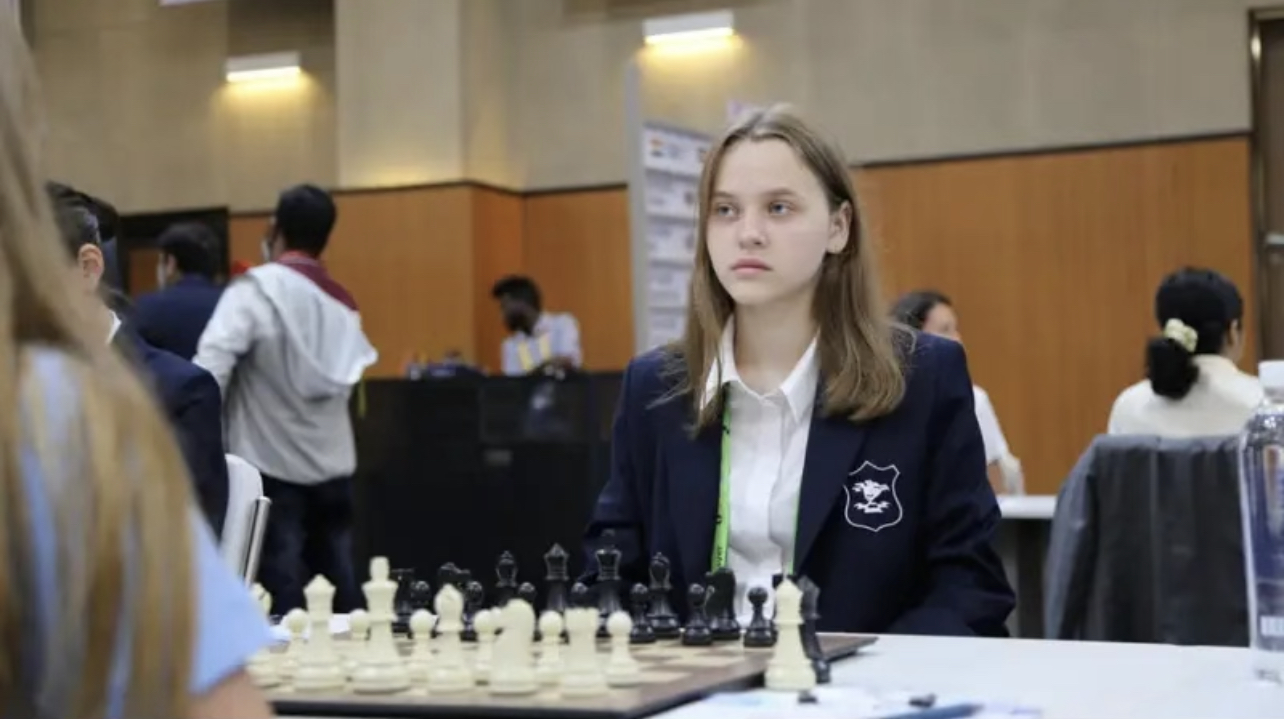ASTANA – The Kazakh female chess team demonstrated outstanding results at the World Chess Championship in the under-20 age category in Italy, securing victory in the blitz tournament, according to the Ministry of Tourism and Sports’ press service on Oct. 16.

From left to right: Xeniya Balabayeva, Alua Nurmanova and Assel Serikbay. Photo credit: inform.kz.
Earlier, these young female athletes earned silver medals at the World Team Chess Championship in Poland and excelled at the Asian Games in Hangzhou, securing a third-place finish.
Xeniya Balabayeva, Alua Nurmanova, and Assel Serikbay, who claimed silver at the championship in Poland, shared their experiences and accomplishments with the Kazinform news agency.
Inspiring impressions and triumphs
“The second place in the championship is a significant achievement for our country, especially considering our team had not secured a spot in the top three in the last five attempts. It was a major responsibility, and we were also the youngest team. Perhaps we were underestimated,” said Balabayeva.

Kazakh chess team achieved silver medals at the World Team Chess Championship in Poland. Photo credit: inform.kz.
She noted that the tournament featured the top 12 teams, all competing in a highly charged environment.
“It’s not easy to qualify for this tournament. Selection is based on the Chess Olympiad, and there’s no room for errors; if you lose, there’s no second chance. We couldn’t afford to make mistakes. The teams from Georgia and India were the top-seeded teams. We managed to defeat the Indian team and also competed well against the United States and French teams, who finished third and fourth, respectively. The Georgian team proved to be the strongest opponent and became the tournament’s winner,” added Balabayeva.
Nurmanova, one of the youngest Kazakh women’s chess players in the tournament, shared her perspective on the competition.
“It was a fantastic World Championship, and now it is time to move forward. We set a goal to focus on the quality of our game and get maximum experience without fixating on the final outcome. I think our results exceeded our expectations,” she said.
Overall, the team achieved four wins, four draws, and two losses in the championship. Nurmanova highlighted a memorable game in the semifinals against the French team and how the Kazakh team clinched a win.
“I played against Sophie Milliet, and to advance to the tie-break, our team had to win, as we were defeated in the first match against them. The nature of the game turned from an equal position in the opening into a sharp one, with good attacking chances. Due to the opponent’s mistakes, I managed to capitalize on the initiative in a dynamic style,” said Nurmanova.
She also acknowledged the weight of responsibility she felt representing her nation at the global adult level, at just 16 years of age.
Serikbay had previously participated in major tournaments, including the Olympiad in Georgia in 2018, but this competition marked her first participation in the Women’s World Team Chess Championship.
“The competition was tough. Unfortunately, I played the first game and lost, but our team was strong, spirited, and the youngest among all the competing teams. Overall, the entire tournament was intense, with two rounds every day, but the girls performed exceptionally well,” said Serikbay.
Early passions and aspirations
The athletes also shared how they started in the world of chess. For Balabayeva, the introduction to the game came unexpectedly, and she didn’t initially consider playing professionally.

Xeniya Balabayeva. Photo credit: inform.kz.
“When I changed schools, I found a more experienced chess coach who kick-started my professional career and initial achievements. After several years, I realized that I would be playing chess at a professional level. From that point on, chess became an integral part of my life,” she said.
Nurmanova began her chess journey at nine and was immediately captivated by the game’s complexity and unpredictability.
“I was doing quite well, started showing results, and decided to pursue chess professionally. My father introduced me to chess. He taught me the basics of the game after seeing the spark of interest in my eyes and always agreed to play training games,” said Nurmanova.
Serikbay recalled her introduction to chess at the age of six when chess coach Riza Koshkarova visited her school and invited students to join the chess club.
“I was among the ten students who enrolled. She taught us the rules and the moves of each piece. I became interested and never missed a class since then. I loved the knight and bishop pieces from the first days of playing. Before that, I had never heard of this game. Initially, my family was against my choice. However, they eventually agreed and allowed me to attend the chess group. My grandfather would take me to the club every day after lunch, and that’s when my exciting journey into the world of chess began,” she said.
Though Serikbay claimed a championship title at age 15, her notable achievement was securing first place in the World School Chess Championship, specifically for girls under nine, back in 2011.
“From that moment, I aspired to make chess an integral part of my future, possibly becoming a coach and establishing a chess school in Kyzylorda. However, over time, you realize that things are not always straightforward. For now, I wish to continue playing and competing in tournaments, enjoying the game, and representing my country on the international stage,” she said, holding onto her childhood ambition of earning the Woman Grandmaster title.
The pillars of chess success
Serikbay emphasized the importance of perseverance, determination, and endurance for a strong chess player.
“Admittedly, there are moments when I forget about these qualities myself. There are times when you feel down. But these qualities are essential not only in chess but also in other sports,” she noted.
Balabayeva echoed Serikbay’s views, acknowledging that coping with losses can be particularly challenging. However, she emphasized the importance of a resilient mindset, self-reflection regarding motivation, and perseverance despite setbacks.
“It is necessary to stay focused and reaffirm your commitment. If you don’t persevere, others will seize the opportunity. I believe that enduring competitiveness and the desire to triumph are powerful motivators, ultimately helping you to overcome obstacles,” she said.
Balabayeva also underscored the significance of genuine passion for chess among aspiring players, advising against pursuing it solely due to external pressure or influence. She stressed the need for consistent practice and dedication to the game.
“Participation in numerous tournaments, skill refinement, practice against formidable opponents, and accumulating experience is essential,” she said. “I strive to allocate a minimum of four hours of training each day, and even more during training camps. The Women’s Chess Championship in Kazakhstan is on the horizon this year, and I aim to excel in upcoming tournaments and demonstrate my proficiency.”
The article was originally published in Kazinform.
